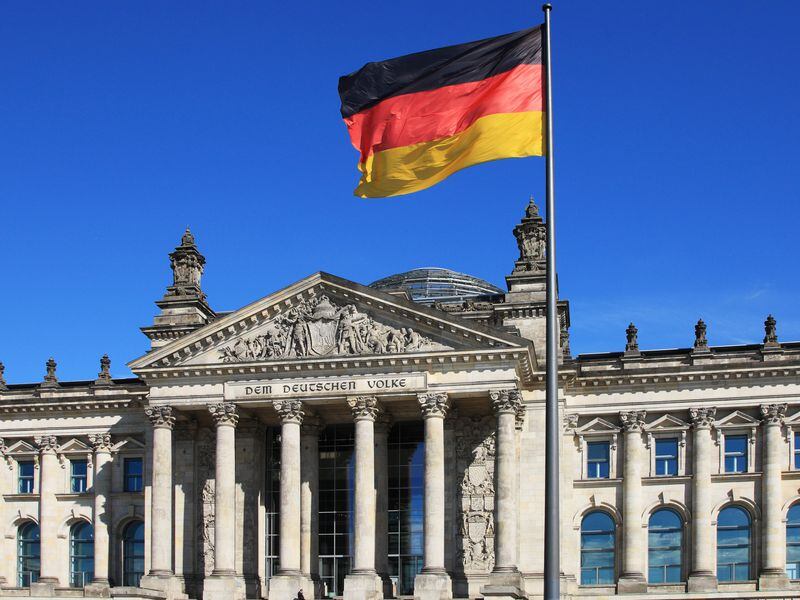Germany may have finally come out with a legal reason why they offloaded nearly $3 billion worth of bitcoin (BTC) into the open market, but industry experts aren't sold on the reasoning.
Germany seized about 50,000 bitcoin in January from the operator of Movie2k.to, a website the state of Saxony found guilty of money laundering and other illegal activities. The state, with the help of Frankfurt-based German securities trading bank Bankhaus Scheich Wertpapierspezialist AG, and the Federal Criminal Police Office, sold about 49,858 bitcoin between June 19 and July 12, securing 2.6 billion euros ($2.8 billion), according to a statement on Wednesday.
The move perplexed traders and put severe pressure on the price of bitcoin while the authorities stayed mum on the reasons behind the selling spree. The selloff pressure was intensified at the time as the market was also cautious of mass selling by Mt. Gox creditors and faster liquidations by bitcoin miners.
Prices bottomed early this month at around $53,500 after Saxony completed its liquidation process but not before wreaking havoc on the market as BTC fell over 7% in June.
When the authorities finally issued a statement this week, the process was called a "market-friendly sale," which "was gentle on the market." The statement claimed that "a fair market price was always achieved" and said that "at this scale, there is no direct influence on the bitcoin price."
However, experts aren't convinced.
Romina Bungert, Advisor to Enzyme and ex-CFO Centrifuge, told CoinDesk "this is a perfect example for the kind of unintentional malicious activity based on a lack of competence that can come from governments and authorities."
“How they handled this sell-off moved the market and is intervention in public markets,” Bungert said. “So, who will have an incentive now to hold this national authority accountable - not the state.”
In an email to CoinDesk, Dr. Patrick Pintaske, Prosecutor and Press spokesman of the Head of Special Procedures Division (UA BV) said “The legally regulated emergency sale means that we cannot wait to see whether and how the market value will change. The economic value of seized assets should be preserved as far as possible for later judicial confiscation.”
Bad timing
The German authority may have justified its decision to sell, but market observers have questioned the timing of the sale and the benefit to taxpayers.
Philipp Hartmannsgruber, a Bitcoin expert who isn't convinced by the reasons laid out in Wednesday's statement, said the sale earned around EUR 600 million more than its value (€1.96 billion at €39,400) at the time of the seizure in January.
He asked “how much could the taxpayer have made if bitcoin had been held for the long term? At the current bitcoin exchange rate of around EUR 60,000, they would be worth around €390 million more today.”
Hartmannsgruber, who regularly advises politicians and authorities as a board member of the Blockchain Bundesverband e.V. (German Blockchain Association), specifically argued that the sale should not have been done “during the announcement that up to 140,000 Bitcoin worth approximately $7.7 billion from the Mt. Gox lawsuit will come to the market" even though he emphasized that perfect timing is never possible.
Hartmannsgruber also asked the authorities to point to sources behind their claim that
“less than one percent of the market volume of bitcoins was regularly traded over the counter (OTC)…having ”no direct influence on the bitcoin price.”
“This may not be the case on July 8, 2024, when up to 16,309 BTC worth approximately €830 million were sold. If 16,300 Bitcoin are sold in one day, this can have an enormous impact under certain circumstances.”
Legal “grey line”
The statement argued that the authorities did not have a choice but to sell but experts point to a grey area because the boundaries when you need to sell as an act of emergency seem a bit less clear.
The court did not require selling the bitcoin because the statement said the proceedings were only “provisionally secured” as the concerned court has not yet made a decision on the confiscation becoming legally binding. The decision, the statement said, was made because “The sale of valuable items before the conclusion of ongoing criminal proceedings is legally required whenever there is a risk of a significant loss of value of around ten percent or more.” It further argued that given the volatility in the bitcoin market “These conditions were always met.”
Lawyer and partner at GSK, Timo Bernau indicated the authorities had banked on a general principle from a legal precedent to justify their sale. “In German law, a general ban on speculation is assumed for public authorities. Such a ban on speculation with public funds is derived from the budgetary principle of economic efficiency and economy,” Bernau said pointing to a 2017 ruling by the Federal Court of Justice.
Bungert noted that there was a legal “gray line” because “the rules for this government agency on handling digital assets are not covered by the existing rule set.”
Hartmannsgruber argued the authorities cited Section 111p of the Code of Criminal Procedure to suggest they had no choice but to sell the bitcoin. However, the law states that after “an object that has been seized …may be sold if there is a risk of its spoilage or a significant loss of value”
“The law therefore does not provide for an obligation, but merely an opportunity to sell. It is therefore questionable whether the disposal was legally required," Hartmannsgruber said.
"Although there are legal reasons why the Attorney General's Office acted in this way, if it was not obliged to do so, the question arises as to why it nevertheless acted in this way and why it presented its actions as a supposed duty.”
Omkar Godbole contributed to this report.
Read more: It's Not Germany Selling Bitcoin. It's One of Its States and It Has No Choice.
Edited by Aoyon Ashraf.
